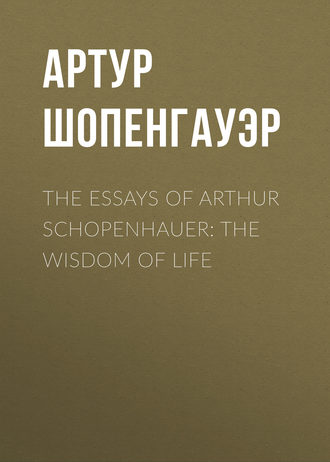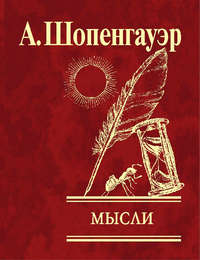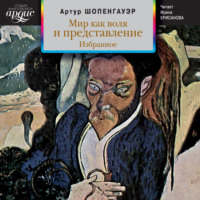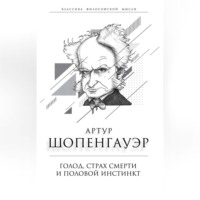 полная версия
полная версияThe Essays of Arthur Schopenhauer: the Wisdom of Life
Then it has been said that the manners and tone of good society are ultimately based upon this principle of honor, which, with its system of duels, is made out to be a bulwark against the assaults of savagery and rudeness. But Athens, Corinth and Rome could assuredly boast of good, nay, excellent society, and manners and tone of a high order, without any support from the bogey of knightly honor. It is true that women did not occupy that prominent place in ancient society which they hold now, when conversation has taken on a frivolous and trifling character, to the exclusion of that weighty discourse which distinguished the ancients.
This change has certainly contributed a great deal to bring about the tendency, which is observable in good society now-a-days, to prefer personal courage to the possession of any other quality. The fact is that personal courage is really a very subordinate virtue, – merely the distinguishing mark of a subaltern, – a virtue, indeed, in which we are surpassed by the lower animals; or else you would not hear people say, as brave as a lion. Far from being the pillar of society, knightly honor affords a sure asylum, in general for dishonesty and wickedness, and also for small incivilities, want of consideration and unmannerliness. Rude behavior is often passed over in silence because no one cares to risk his neck in correcting it.
After what I have said, it will not appear strange that the dueling system is carried to the highest pitch of sanguinary zeal precisely in that nation whose political and financial records show that they are not too honorable. What that nation is like in its private and domestic life, is a question which may be best put to those who are experienced in the matter. Their urbanity and social culture have long been conspicuous by their absence.
There is no truth, then, in such pretexts. It can be urged with more justice that as, when you snarl at a dog, he snarls in return, and when you pet him, he fawns; so it lies in the nature of men to return hostility by hostility, and to be embittered and irritated at any signs of depreciatory treatment or hatred: and, as Cicero says, there is something so penetrating in the shaft of envy that even men of wisdom and worth find its wound a painful one; and nowhere in the world, except, perhaps, in a few religious sects, is an insult or a blow taken with equanimity. And yet a natural view of either would in no case demand anything more than a requital proportionate to the offence, and would never go to the length of assigning death as the proper penalty for anyone who accuses another of lying or stupidity or cowardice. The old German theory of blood for a blow is a revolting superstition of the age of chivalry. And in any case the return or requital of an insult is dictated by anger, and not by any such obligation of honor and duty as the advocates of chivalry seek to attach to it. The fact is that, the greater the truth, the greater the slander; and it is clear that the slightest hint of some real delinquency will give much greater offence than a most terrible accusation which is perfectly baseless: so that a man who is quite sure that he has done nothing to deserve a reproach may treat it with contempt, and will be safe in doing so. The theory of honor demands that he shall show a susceptibility which he does not possess, and take bloody vengeance for insults which he cannot feel. A man must himself have but a poor opinion of his own worth who hastens to prevent the utterance of an unfavorable opinion by giving his enemy a black eye.
True appreciation of his own value will make a man really indifferent to insult; but if he cannot help resenting it, a little shrewdness and culture will enable him to save appearances and dissemble his anger. If he could only get rid of this superstition about honor – the idea, I mean, that it disappears when you are insulted, and can be restored by returning the insult; if we could only stop people from thinking that wrong, brutality and insolence can be legalized by expressing readiness to give satisfaction, that is, to fight in defence of it, we should all soon come to the general opinion that insult and depreciation are like a battle in which the loser wins; and that, as Vincenzo Monti says, abuse resembles a church-procession, because it always returns to the point from which it set out. If we could only get people to look upon insult in this light, we should no longer have to say something rude in order to prove that we are in the right. Now, unfortunately, if we want to take a serious view of any question, we have first of all to consider whether it will not give offence in some way or other to the dullard, who generally shows alarm and resentment at the merest sign of intelligence; and it may easily happen that the head which contains the intelligent view has to be pitted against the noodle which is empty of everything but narrowness and stupidity. If all this were done away with, intellectual superiority could take the leading place in society which is its due – a place now occupied, though people do not like to confess it, by excellence of physique, mere fighting pluck, in fact; and the natural effect of such a change would be that the best kind of people would have one reason the less for withdrawing from society. This would pave the way for the introduction of real courtesy and genuinely good society, such as undoubtedly existed in Athens, Corinth and Rome. If anyone wants to see a good example of what I mean, I should like him to read Xenophon's Banquet.
The last argument in defence of knightly honor no doubt is, that, but for its existence, the world – awful thought! – would be a regular bear-garden. To which I may briefly reply that nine hundred and ninety-nine people out of a thousand who do not recognize the code, have often given and received a blow without any fatal consequences: whereas amongst the adherents of the code a blow usually means death to one of the parties. But let me examine this argument more closely.
I have often tried to find some tenable, or at any rate, plausible basis – other than a merely conventional one – some positive reasons, that is to say, for the rooted conviction which a portion of mankind entertains, that a blow is a very dreadful thing; but I have looked for it in vain, either in the animal or in the rational side of human nature. A blow is, and always will be, a trivial physical injury which one man can do to another; proving, thereby, nothing more than his superiority in strength or skill, or that his enemy was off his guard. Analysis will carry us no further. The same knight who regards a blow from the human hand as the greatest of evils, if he gets a ten times harder blow from his horse, will give you the assurance, as he limps away in suppressed pain, that it is a matter of no consequence whatever. So I have come to think that it is the human hand which is at the bottom of the mischief. And yet in a battle the knight may get cuts and thrusts from the same hand, and still assure you that his wounds are not worth mentioning. Now, I hear that a blow from the flat of a sword is not by any means so bad as a blow from a stick; and that, a short time ago, cadets were liable to be punished by the one but not the other, and that the very greatest honor of all is the accolade. This is all the psychological or moral basis that I can find; and so there is nothing left me but to pronounce the whole thing an antiquated superstition that has taken deep root, and one more of the many examples which show the force of tradition. My view is confirmed by the well-known fact that in China a beating with a bamboo is a very frequent punishment for the common people, and even for officials of every class; which shows that human nature, even in a highly civilized state, does not run in the same groove here and in China.
On the contrary, an unprejudiced view of human nature shows that it is just as natural for a man to beat as it is for savage animals to bite and rend in pieces, or for horned beasts to butt or push. Man may be said to be the animal that beats. Hence it is revolting to our sense of the fitness of things to hear, as we sometimes do, that one man bitten another; on the other hand, it is a natural and everyday occurrence for him to get blows or give them. It is intelligible enough that, as we become educated, we are glad to dispense with blows by a system of mutual restraint. But it is a cruel thing to compel a nation or a single class to regard a blow as an awful misfortune which must have death and murder for its consequences. There are too many genuine evils in the world to allow of our increasing them by imaginary misfortunes, which brings real ones in their train: and yet this is the precise effect of the superstition, which thus proves itself at once stupid and malign.
It does not seem to me wise of governments and legislative bodies to promote any such folly by attempting to do away with flogging as a punishment in civil or military life. Their idea is that they are acting in the interests of humanity; but, in point of fact, they are doing just the opposite; for the abolition of flogging will serve only to strengthen this inhuman and abominable superstition, to which so many sacrifices have already been made. For all offences, except the worst, a beating is the obvious, and therefore the natural penalty; and a man who will not listen to reason will yield to blows. It seems to me right and proper to administer corporal punishment to the man who possesses nothing and therefore cannot be fined, or cannot be put in prison because his master's interests would suffer by the loss of his service. There are really no arguments against it: only mere talk about the dignity of man– talk which proceeds, not from any clear notions on the subject, but from the pernicious superstition I have been describing. That it is a superstition which lies at the bottom of the whole business is proved by an almost laughable example. Not long ago, in the military discipline of many countries, the cat was replaced by the stick. In either case the object was to produce physical pain; but the latter method involved no disgrace, and was not derogatory to honor.
By promoting this superstition, the State is playing into the hands of the principle of knightly honor, and therefore of the duel; while at the same time it is trying, or at any rate it pretends it is trying, to abolish the duel by legislative enactment. As a natural consequence we find that this fragment of the theory that might is right, which has come down to us from the most savage days of the Middle Age, has still in this nineteenth century a good deal of life left in it – more shame to us! It is high time for the principle to be driven out bag and baggage. Now-a-days no one is allowed to set dogs or cocks to fight each other, – at any rate, in England it is a penal offence, – but men are plunged into deadly strife, against their will, by the operation of this ridiculous, superstitious and absurd principle, which imposes upon us the obligation, as its narrow-minded supporters and advocates declare, of fighting with one another like gladiators, for any little trifle. Let me recommend our purists to adopt the expression baiting55 instead of duel, which probably comes to us, not from the Latin duellum, but from the Spanish duelo, – meaning suffering, nuisance, annoyance.
In any case, we may well laugh at the pedantic excess to which this foolish system has been carried. It is really revolting that this principle, with its absurd code, can form a power within the State —imperium in imperio– a power too easily put in motion, which, recognizing no right but might, tyrannizes over the classes which come within its range, by keeping up a sort of inquisition, before which any one may be haled on the most flimsy pretext, and there and then be tried on an issue of life and death between himself and his opponent. This is the lurking place from which every rascal, if he only belongs to the classes in question, may menace and even exterminate the noblest and best of men, who, as such, must of course be an object of hatred to him. Our system of justice and police-protection has made it impossible in these days for any scoundrel in the street to attack us with —Your money or your life! An end should be put to the burden which weighs upon the higher classes – the burden, I mean, of having to be ready every moment to expose life and limb to the mercy of anyone who takes it into his rascally head to be coarse, rude, foolish or malicious. It is perfectly atrocious that a pair of silly, passionate boys should be wounded, maimed or even killed, simply because they have had a few words.
The strength of this tyrannical power within the State, and the force of the superstition, may be measured by the fact that people who are prevented from restoring their knightly honor by the superior or inferior rank of their aggressor, or anything else that puts the persons on a different level, often come to a tragic-comic end by committing suicide in sheer despair. You may generally know a thing to be false and ridiculous by finding that, if it is carried to its logical conclusion, it results in a contradiction; and here, too, we have a very glaring absurdity. For an officer is forbidden to take part in a duel; but if he is challenged and declines to come out, he is punished by being dismissed the service.
As I am on the matter, let me be more frank still. The important distinction, which is often insisted upon, between killing your enemy in a fair fight with equal weapons, and lying in ambush for him, is entirely a corollary of the fact that the power within the State, of which I have spoken, recognizes no other right than might, that is, the right of the stronger, and appeals to a Judgment of God as the basis of the whole code. For to kill a man in a fair fight, is to prove that you are superior to him in strength or skill; and to justify the deed, you must assume that the right of the stronger is really a right.
But the truth is that, if my opponent is unable to defend himself, it gives me the possibility, but not by any means the right, of killing him. The right, the moral justification, must depend entirely upon the motives which I have for taking his life. Even supposing that I have sufficient motive for taking a man's life, there is no reason why I should make his death depend upon whether I can shoot or fence better than he. In such a case, it is immaterial in what way I kill him, whether I attack him from the front or the rear. From a moral point of view, the right of the stronger is no more convincing than the right of the more skillful; and it is skill which is employed if you murder a a man treacherously. Might and skill are in this case equally right; in a duel, for instance, both the one and the other come into play; for a feint is only another name for treachery. If I consider myself morally justified in taking a man's life, it is stupid of me to try first of all whether he can shoot or fence better than I; as, if he can, he will not only have wronged me, but have taken my life into the bargain.
It is Rousseau's opinion that the proper way to avenge an insult is, not to fight a duel with your aggressor, but to assassinate him, – an opinion, however, which he is cautious enough only to barely indicate in a mysterious note to one of the books of his Emile. This shows the philosopher so completely under the influence of the mediaeval superstition of knightly honor that he considers it justifiable to murder a man who accuses you of lying: whilst he must have known that every man, and himself especially, has deserved to have the lie given him times without number.
The prejudice which justifies the killing of your adversary, so long as it is done in an open contest and with equal weapons, obviously looks upon might as really right, and a duel as the interference of God. The Italian who, in a fit of rage, falls upon his aggressor wherever he finds him, and despatches him without any ceremony, acts, at any rate, consistently and naturally: he may be cleverer, but he is not worse, than the duelist. If you say, I am justified in killing my adversary in a duel, because he is at the moment doing his best to kill me; I can reply that it is your challenge which has placed him under the necessity of defending himself; and that by mutually putting it on the ground of self-defence, the combatants are seeking a plausible pretext for committing murder. I should rather justify the deed by the legal maxim Volenti non fit injuria; because the parties mutually agree to set their life upon the issue.
This argument may, however, be rebutted by showing that the injured party is not injured volens; because it is this tyrannical principle of knightly honor, with its absurd code, which forcibly drags one at least of the combatants before a bloody inquisition.
I have been rather prolix on the subject of knightly honor, but I had good reason for being so, because the Augean stable of moral and intellectual enormity in this world can be cleaned out only with the besom of philosophy. There are two things which more than all else serve to make the social arrangements of modern life compare unfavorably with those of antiquity, by giving our age a gloomy, dark and sinister aspect, from which antiquity, fresh, natural and, as it were, in the morning of life, is completely free; I mean modern honor and modern disease, —par nobile fratrum! – which have combined to poison all the relations of life, whether public or private. The second of this noble pair extends its influence much farther than at first appears to be the case, as being not merely a physical, but also a moral disease. From the time that poisoned arrows have been found in Cupid's quiver, an estranging, hostile, nay, devilish element has entered into the relations of men and women, like a sinister thread of fear and mistrust in the warp and woof of their intercourse; indirectly shaking the foundations of human fellowship, and so more or less affecting the whole tenor of existence. But it would be beside my present purpose to pursue the subject further.
An influence analogous to this, though working on other lines, is exerted by the principle of knightly honor, – that solemn farce, unknown to the ancient world, which makes modern society stiff, gloomy and timid, forcing us to keep the strictest watch on every word that falls. Nor is this all. The principle is a universal Minotaur; and the goodly company of the sons of noble houses which it demands in yearly tribute, comes, not from one country alone, as of old, but from every land in Europe. It is high time to make a regular attack upon this foolish system; and this is what I am trying to do now. Would that these two monsters of the modern world might disappear before the end of the century!
Let us hope that medicine may be able to find some means of preventing the one, and that, by clearing our ideals, philosophy may put an end to the other: for it is only by clearing our ideas that the evil can be eradicated. Governments have tried to do so by legislation, and failed.
Still, if they are really concerned to stop the dueling system; and if the small success that has attended their efforts is really due only to their inability to cope with the evil, I do not mind proposing a law the success of which I am prepared to guarantee. It will involve no sanguinary measures, and can be put into operation without recourse either to the scaffold or the gallows, or to imprisonment for life. It is a small homeopathic pilule, with no serious after effects. If any man send or accept a challenge, let the corporal take him before the guard house, and there give him, in broad daylight, twelve strokes with a stick a la Chinoise; a non-commissioned officer or a private to receive six. If a duel has actually taken place, the usual criminal proceedings should be instituted.
A person with knightly notions might, perhaps, object that, if such a punishment were carried out, a man of honor would possibly shoot himself; to which I should answer that it is better for a fool like that to shoot himself rather than other people. However, I know very well that governments are not really in earnest about putting down dueling. Civil officials, and much more so, officers in the army, (except those in the highest positions), are paid most inadequately for the services they perform; and the deficiency is made up by honor, which is represented by titles and orders, and, in general, by the system of rank and distinction. The duel is, so to speak, a very serviceable extra-horse for people of rank: so they are trained in the knowledge of it at the universities. The accidents which happen to those who use it make up in blood for the deficiency of the pay.
Just to complete the discussion, let me here mention the subject of national honor. It is the honor of a nation as a unit in the aggregate of nations. And as there is no court to appeal to but the court of force; and as every nation must be prepared to defend its own interests, the honor of a nation consists in establishing the opinion, not only that it may be trusted (its credit), but also that it is to be feared. An attack upon its rights must never be allowed to pass unheeded. It is a combination of civic and knightly honor.
Section 5. – Fame.
Under the heading of place in the estimation of the world we have put Fame; and this we must now proceed to consider.
Fame and honor are twins; and twins, too, like Castor and Pollux, of whom the one was mortal and the other was not. Fame is the undying brother of ephemeral honor. I speak, of course, of the highest kind of fame, that is, of fame in the true and genuine sense of the word; for, to be sure, there are many sorts of fame, some of which last but a day. Honor is concerned merely with such qualities as everyone may be expected to show under similar circumstances; fame only of those which cannot be required of any man. Honor is of qualities which everyone has a right to attribute to himself; fame only of those which should be left to others to attribute. Whilst our honor extends as far as people have knowledge of us; fame runs in advance, and makes us known wherever it finds its way. Everyone can make a claim to honor; very few to fame, as being attainable only in virtue of extraordinary achievements.
These achievements may be of two kinds, either actions or works; and so to fame there are two paths open. On the path of actions, a great heart is the chief recommendation; on that of works, a great head. Each of the two paths has its own peculiar advantages and detriments; and the chief difference between them is that actions are fleeting, while works remain. The influence of an action, be it never so noble, can last but a short time; but a work of genius is a living influence, beneficial and ennobling throughout the ages. All that can remain of actions is a memory, and that becomes weak and disfigured by time – a matter of indifference to us, until at last it is extinguished altogether; unless, indeed, history takes it up, and presents it, fossilized, to posterity. Works are immortal in themselves, and once committed to writing, may live for ever. Of Alexander the Great we have but the name and the record; but Plato and Aristotle, Homer and Horace are alive, and as directly at work to-day as they were in their own lifetime. The Vedas, and their Upanishads, are still with us: but of all contemporaneous actions not a trace has come down to us.56
Another disadvantage under which actions labor is that they depend upon chance for the possibility of coming into existence; and hence, the fame they win does not flow entirely from their intrinsic value, but also from the circumstances which happened to lend them importance and lustre. Again, the fame of actions, if, as in war, they are purely personal, depends upon the testimony of fewer witnesses; and these are not always present, and even if present, are not always just or unbiased observers. This disadvantage, however, is counterbalanced by the fact that actions have the advantage of being of a practical character, and, therefore, within the range of general human intelligence; so that once the facts have been correctly reported, justice is immediately done; unless, indeed, the motive underlying the action is not at first properly understood or appreciated. No action can be really understood apart from the motive which prompted it.









